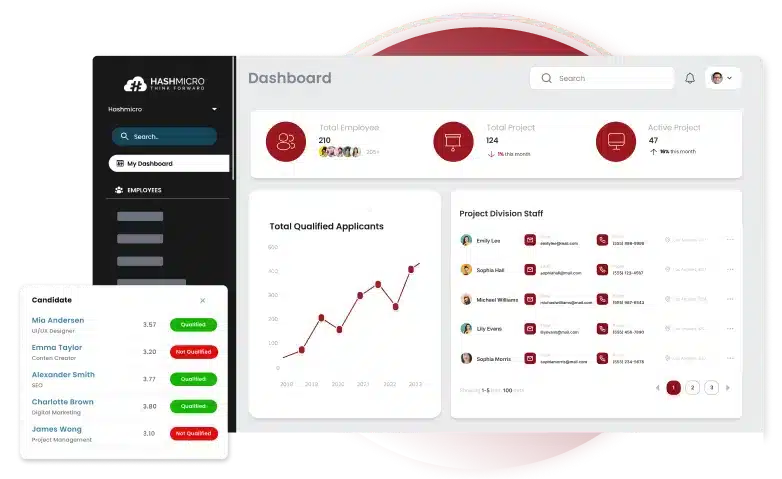Have you ever wondered how top companies consistently achieve their goals while keeping teams aligned and motivated? The secret lies in Key Performance Indicators (KPIs), which connect strategy with measurable outcomes.
Despite their importance, many managers struggle to set effective KPIs that truly reflect organizational goals. Unclear targets and irrelevant metrics can lead to confusion and wasted resources, highlighting the need for a strategic approach.
HashMicro HRIS offers tools to streamline KPI development, ensuring alignment with business objectives and clarity in performance tracking. With its comprehensive features, you can enhance your KPI strategy and drive measurable success.
This article will guide you through the fundamentals of KPIs, address common challenges, and introduce effective solutions like HashMicro’s HR management system Malaysia. Dive in to learn how you can revolutionize your KPI strategy and achieve success.
Key Takeaways
|
Table of Content
Content Lists

What is a Key Performance Indicators?
A Key Performance Indicator (KPI) is a measurable value used to evaluate performance over time toward specific objectives. These indicators provide clear targets for teams, milestones to track progress, and valuable insights that enable organizations to make informed decisions. The key performance indicators meaning extends to various contexts, including industries like BPO, where metrics such as customer satisfaction and service quality are crucial.
To remain effective, KPI success benchmarks must be easy to understand, aligned with strategic goals, and measurable at regular intervals. Examples of key performance indicators include sales growth, net promoter scores, and operational efficiency. Understanding KPI meaning in work involves tracking employee productivity and project timelines to ensure alignment with overall objectives.
Why are KPIs Important?
Key performance indicators align individual and team efforts with organizational goals. By providing measurable targets, they ensure every team member understands their role in achieving broader objectives. KPIs serve as a reliable health check for your organization, offering insights into areas like operational efficiency and financial performance. These performance metrics help leaders gain a realistic view of successes and challenges, empowering them to make informed decisions.
Moreover, KPIs promote accountability by allowing teams and managers to monitor progress transparently. This continuous tracking enables organizations to replicate successful strategies while addressing inefficiencies, driving consistent improvement across all areas.
Main Types of Key Performance Indicators
Key Performance Indicators (KPIs) are tools organizations use to measure performance and track progress toward strategic goals. The type of KPIs selected depends on the business sector and objectives, ranging from financial metrics to non-financial indicators tailored to specific industries.
-
Financial KPI
These assess a company’s financial health and ability to sustain growth. Examples include gross profit margin, net profit margin, and accounts receivable turnover. These metrics help evaluate profitability and operational efficiency, ensuring financial stability.
-
Non-Financial KPI
These focus on operational and customer-centric factors that indirectly impact profitability. Indicators like workforce turnover, customer satisfaction scores, and market share analysis provide insights into brand retention and growth potential.
-
Industry-Specific KPI
Different industries rely on specialized KPIs to address unique challenges. In manufacturing, metrics like defect rates and cycle time measure production efficiency. Customer service teams might track first-call resolution rates to ensure client satisfaction.
By leveraging these key performance indicators, organizations can better understand their performance drivers and make data-driven decisions to stay competitive. Using HR software Malaysia can streamline the process of tracking and managing these KPIs effectively.
Benefits of Key Performance Indicators
Key Performance Indicators (KPIs) are essential for tracking progress, guiding decisions, aligning teams, and fostering accountability. These performance metrics ensure that organizations achieve measurable success.
-
Clarifies Organizational Progress
KPIs define clear targets, helping businesses measure whether they are moving forward. This clarity enables accurate evaluations and better decision-making.
-
Guides Strategic Decision-Making
KPIs provide visibility into successes and failures, enabling informed choices. This ensures decisions are based on measurable outcomes, not assumptions.
-
Aligns Organization on Shared Goals
KPIs unify teams by defining what success looks like and aligning efforts toward shared objectives. Clear targets ensure consistent performance management.
-
Creates Team Accountability
KPIs establish benchmarks that hold teams responsible for their performance. This fosters transparency and drives continuous improvement.
Factors Affecting KPI Effectiveness
The effectiveness of key performance indicators largely depends on their relevance to the company’s specific goals. While adopting industry-standard KPI metrics is common, businesses must ensure these indicators truly reflect their performance and align with strategic objectives, which can also influence considerations like prorated salary adjustments.
Creating effective KPIs requires input from analysts, department heads, and managers. By integrating diverse perspectives, companies can develop key performance indicators for employees that measure business processes accurately. Using the SMART framework—Specific, Measurable, Achievable, Realistic, and Time-bound—ensures goals are well-structured and effective, and can help in determining prorated salary calculations when necessary.
Tips for Developing Effective KPIs
Creating impactful key performance indicators requires a strategic approach that aligns with business objectives. Here are practical tips to guide you:
- Define How KPIs Will Be Used
Engage with those who will use the KPI reports to understand their goals. This ensures that your KPIs are relevant and add value to decision-making. - Tie KPIs to Strategic Goals
Ensure every KPI connects directly to the company’s broader strategic goals. This alignment avoids wasting time and resources on irrelevant metrics. - Write SMART KPIs
Craft KPIs using the SMART framework—Specific, Measurable, Attainable, Realistic, and Time-bound. These well-structured KPIs make tracking and achieving success straightforward. - Keep KPIs Clear-Cut
Ensure your KPIs are simple and easy to understand so everyone in the organization can act on them. Enhancing data literacy empowers employees to make informed decisions. - Plan to Iterate
Regularly review and update your KPIs to maintain their relevance. Adjust them if they no longer align with objectives or fail to deliver actionable insights.
Steps to a Stronger Key Performance Indicators Strategy
A well-executed KPI strategy ensures that key performance indicators effectively drive business success. Here are steps to refine your approach:
- Select KPIs That Matter Most
Focus on a balanced mix of leading and lagging indicators. Leading indicators help predict future outcomes, while lagging indicators measure past results. - Create a KPI-Driven Culture
Ensure everyone understands the purpose and value of KPIs. Educate employees on how to interpret and use key performance indicators effectively. - Iterate for Continuous Improvement
Regularly review and update your KPI metrics to ensure they remain relevant. This adaptability helps align KPIs with evolving goals and market changes.
By implementing these strategies, businesses can foster alignment, accountability, and adaptability across teams, ensuring continuous improvement and measurable success.
Streamline Your KPI Management with HashMicro HRM Software
HashMicro HRM is a leading provider of performance management tools designed to optimize KPI management and enhance employee performance tracking. With its innovative technology, HashMicro’s HRM software empowers businesses to automate KPI monitoring, streamline appraisals, and manage promotions or training programs efficiently.
Why We Recommend It:
HashMicro’s HRM, integrated with ERP software, offers advanced tools for KPI management, such as real-time performance tracking, automated appraisals, and detailed reporting. These features enable businesses to tackle performance challenges effectively, ensuring alignment with organizational objectives and fostering employee growth.
Key Features:
- Roster & Dynamic Employee Working Schedule Management: Create and manage flexible employee schedules, ensuring alignment with productivity goals.
- Mobile Apps for Employee Self-Service: Enable employees to access their KPI metrics, submit requests, and review performance anytime, promoting transparency and accountability.
- Employee Probation Management: Streamline the evaluation of employees during their probation period by monitoring performance against set KPIs.
- In-depth Leaves Management with Carryover and Expiry: Track employee leave balances with precise rules, ensuring compliance with attendance policies.
- Complete Overtime Management Linked with Attendance and Payroll: Automate tracking of overtime hours and link data directly to payroll and KPIs.
- In-Depth Leaves, Payroll, Expenses, Overtime, Attendance Reporting: Generate detailed insights into employee data to evaluate KPI performance.
- Employee Disciplinary Management: Monitor employee conduct to ensure adherence to organizational policies and KPI expectations.
- Fully Localized Payroll with Tax Calculation: Integrate KPI outcomes to automate performance-based rewards and accurate tax calculations.
HashMicro’s HRM software integrates seamlessly with other modules, ensuring smooth and efficient HR operations. Its customizable interface adapts to your business needs, empowering you to focus on growth while keeping performance metrics on track.
Conclusion
Key Performance Indicators (KPIs) are essential tools for measuring employee performance and achieving organizational goals. Developing effective KPIs requires careful planning to ensure they align with both short-term objectives and long-term strategies. By implementing a robust KPI strategy, businesses can drive success and make informed, data-driven decisions.
HashMicro’s HRM Software, complemented by Payroll Software Malaysia, offers a comprehensive solution for managing KPIs, simplifying performance monitoring, appraisals, and training management. This integrated platform enhances efficiency and supports your company in achieving its strategic goals. Take the first step toward improving your performance management by scheduling a free demo with HashMicro today.
FAQ about key performance indicators
-
What is key performance indicators examples?
A Key Performance Indicator (KPI) is a measurable value used to evaluate success in achieving specific objectives. Examples include sales growth, customer satisfaction scores, and operational efficiency metrics.
-
What are the 4 main types of performance indicators?
The four main types of performance indicators are financial, non-financial, industry-specific, and internal process KPIs. These indicators help assess various aspects of business performance, from profitability to operational efficiency.
-
What is KPI for employees?
KPIs for employees are specific metrics used to measure individual performance and contribution to organizational goals. They may include targets like sales quotas, project completion rates, or customer service ratings.

































